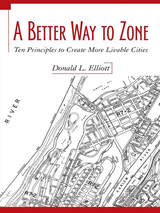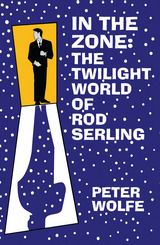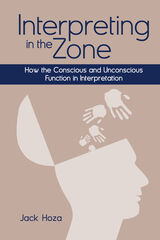3 books about Zone

A Better Way to Zone
Ten Principles to Create More Livable Cities
Donald L. Elliott
Island Press, 2008
Nearly all large American cities rely on zoning to regulate land use. According to Donald L. Elliott, however, zoning often discourages the very development that bigger cities need and want. In fact, Elliott thinks that zoning has become so complex that it is often dysfunctional and in desperate need of an overhaul. A Better Way to Zone explains precisely what has gone wrong and how it can be fixed.
A Better Way to Zone explores the constitutional and legal framework of zoning, its evolution over the course of the twentieth century, the reasons behind major reform efforts of the past, and the adverse impacts of most current city zoning systems. To unravel what has gone wrong, Elliott identifies several assumptions behind early zoning that no longer hold true, four new land use drivers that have emerged since zoning began, and basic elements of good urban governance that are violated by prevailing forms of zoning. With insight and clarity, Elliott then identifies ten sound principles for change that would avoid these mistakes, produce more livable cities, and make zoning simpler to understand and use. He also proposes five practical steps to get started on the road to zoning reform.
While recent discussion of zoning has focused on how cities should look, A Better Way to Zone does not follow that trend. Although New Urbanist tools, form-based zoning, and the SmartCode are making headlines both within and outside the planning profession, Elliott believes that each has limitations as a general approach to big city zoning. While all three trends include innovations that the profession badly needs, they are sometimes misapplied to situations where they do not work well. In contrast, A Better Way to Zone provides a vision of the future of zoning that is not tied to a particular picture of how cities should look, but is instead based on how cities should operate.
A Better Way to Zone explores the constitutional and legal framework of zoning, its evolution over the course of the twentieth century, the reasons behind major reform efforts of the past, and the adverse impacts of most current city zoning systems. To unravel what has gone wrong, Elliott identifies several assumptions behind early zoning that no longer hold true, four new land use drivers that have emerged since zoning began, and basic elements of good urban governance that are violated by prevailing forms of zoning. With insight and clarity, Elliott then identifies ten sound principles for change that would avoid these mistakes, produce more livable cities, and make zoning simpler to understand and use. He also proposes five practical steps to get started on the road to zoning reform.
While recent discussion of zoning has focused on how cities should look, A Better Way to Zone does not follow that trend. Although New Urbanist tools, form-based zoning, and the SmartCode are making headlines both within and outside the planning profession, Elliott believes that each has limitations as a general approach to big city zoning. While all three trends include innovations that the profession badly needs, they are sometimes misapplied to situations where they do not work well. In contrast, A Better Way to Zone provides a vision of the future of zoning that is not tied to a particular picture of how cities should look, but is instead based on how cities should operate.
[more]

In the Zone
The Twilight World of Rod Serling
Peter Wolfe
University of Wisconsin Press, 1997
The classic television show The Twilight Zone explored the possibilities inhering in the ordinary. A Twilight Zone episode moved us by being poignant and intimate, rambunctious or thought provoking. But whether it takes place on an asteroid, in a city pool room, or in the backwoods, it will usually convey both a folklorist’s eye for detail and the born raconteur’s sense of pace. Rod Serling, the show’s originator, main scriptwriter, and artistic director, knew how much burden he could place on his rhetorical and dramatic gifts. Deservedly celebrated as a pioneer fiction writer for television, Serling always grounded his work in the human condition: he wrote movingly about history and loyalty, the grip of everyday reality, and the dangers of both forgetting about one’s ghosts and giving them the upper hand.
[more]

Interpreting in the Zone
How the Conscious and Unconscious Function in Interpretation
Jack Hoza
Gallaudet University Press, 2016
Successful interpretation can feel seamless, an intuitive and efficient translation of meaning from one signed or spoken language to another. Yet the process of interpretation is actually quite complex and relies upon myriad components ranging from preparation to experience to honed judgment. Interpreting in the zone, instinctively and confidently, is an energizing, encompassing experience that results in great satisfaction and top performance—but what does it take to get there?
Jack Hoza’s newest research examines the components that enable interpreters to perform successfully, looking at literature in interpretation, cognitive science, education, psychology, and neuroscience, as well as reviewing the results of two qualitative studies he conducted. He seeks to uncover what it means to interpret in the zone by understanding exactly how the brain works in interpretation scenarios. He explores a range of dichotomies that influence interpretation outcomes, such as:
- Intuition vs. rational thought
- Left brain vs. right brain
- Explicit vs. implicit learning
- Novice vs. master
- Spoken vs. signed languages
- Emotion vs. reasoning
Cognitive processes such as perception, short-term memory, and reflexivity are strong factors in driving successful interpretation and are explored along with habits, behaviors, and learned strategies that can help or hinder interpretation skills. Hoza also considers the importance of professional development and collaboration with other practitioners in order to continually hone expertise.
Interpreting in the Zone shows that cognitive research can help us better understand the intricacies of the interpreting process and has implications for how to approach the interpreting task. This resource will be of value to both the interpreter-in-training as well as the seasoned practitioner.
[more]
READERS
Browse our collection.
PUBLISHERS
See BiblioVault's publisher services.
STUDENT SERVICES
Files for college accessibility offices.
UChicago Accessibility Resources
home | accessibility | search | about | contact us
BiblioVault ® 2001 - 2024
The University of Chicago Press









